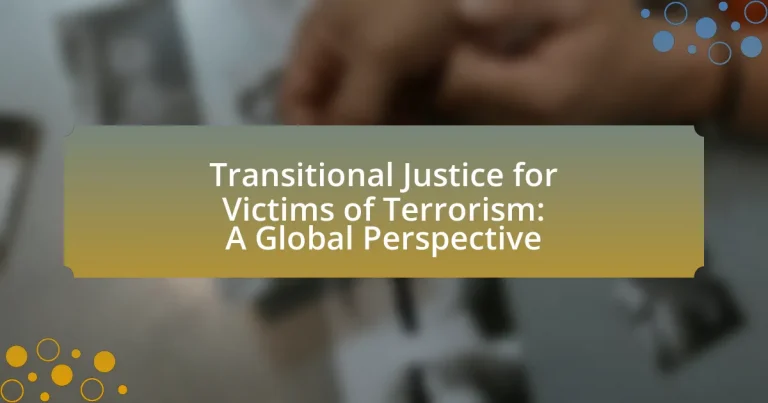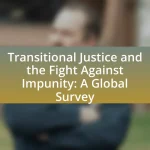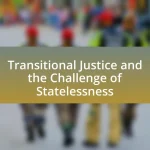Transitional justice for victims of terrorism encompasses a range of judicial and non-judicial measures aimed at addressing the suffering of individuals affected by terrorist acts. This framework focuses on accountability, truth-seeking, reparations, and institutional reform, facilitating healing and reconciliation in societies impacted by violence. Key principles include victim participation and acknowledgment of suffering, as demonstrated by successful cases in countries like Colombia, South Africa, and Tunisia. The article explores the global frameworks, challenges faced by victims, and best practices for implementing transitional justice, emphasizing the importance of community involvement and cultural sensitivities in achieving effective outcomes.
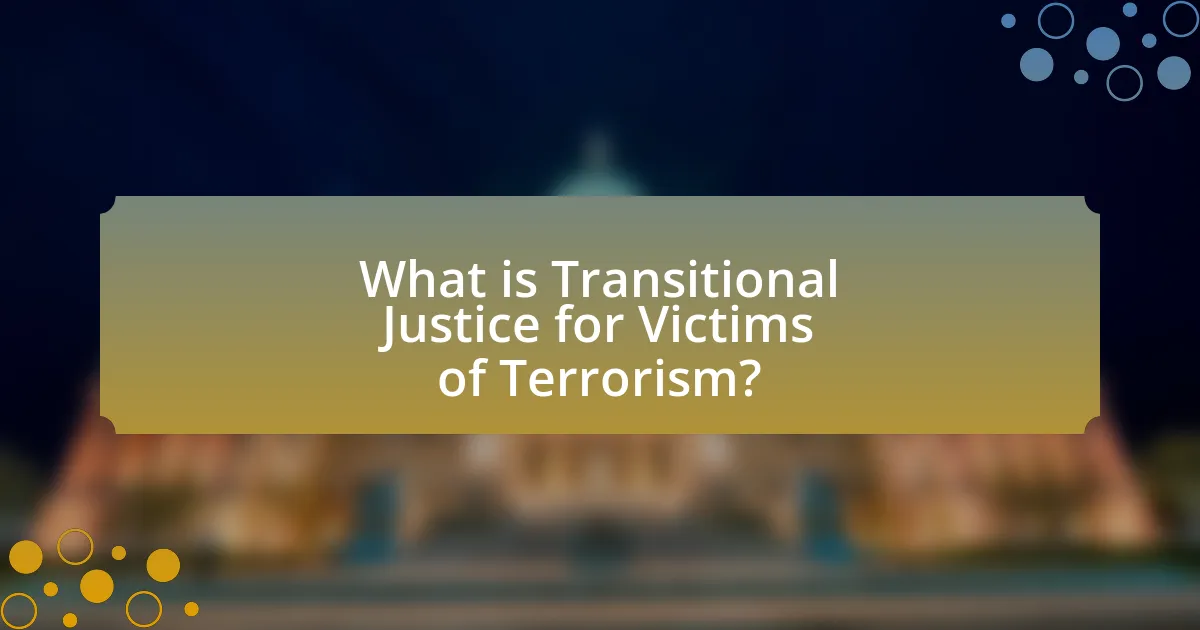
What is Transitional Justice for Victims of Terrorism?
Transitional justice for victims of terrorism refers to a set of judicial and non-judicial measures implemented to address the suffering of individuals affected by terrorist acts. These measures aim to provide accountability, truth, reparations, and guarantees of non-recurrence, thereby facilitating healing and reconciliation in societies impacted by terrorism. For instance, countries like Colombia have established truth commissions to document the experiences of victims and promote restorative justice, highlighting the importance of acknowledging their suffering as part of the broader peace process.
How is Transitional Justice defined in the context of terrorism?
Transitional Justice in the context of terrorism is defined as a set of judicial and non-judicial measures implemented to address the legacies of past human rights violations caused by terrorist acts. This framework aims to provide accountability, truth, reparations, and guarantees of non-recurrence for victims of terrorism, ensuring that their rights are recognized and upheld. For instance, countries like Colombia have integrated transitional justice mechanisms to address the impacts of terrorism, focusing on victim participation and acknowledgment of suffering, which reinforces the validity of this definition.
What are the key principles of Transitional Justice?
The key principles of Transitional Justice include accountability, truth-seeking, reparations, and institutional reform. Accountability ensures that perpetrators of human rights violations are held responsible, which is crucial for restoring trust in the rule of law. Truth-seeking involves uncovering the facts about past abuses, often through truth commissions, to provide victims with recognition and validation. Reparations address the harm suffered by victims, offering compensation or restitution to help them rebuild their lives. Institutional reform aims to prevent future violations by transforming state institutions, ensuring they uphold human rights and the rule of law. These principles are essential for fostering reconciliation and establishing a foundation for sustainable peace in post-conflict societies.
How does Transitional Justice differ from traditional justice systems?
Transitional Justice differs from traditional justice systems primarily in its focus on addressing past human rights violations and promoting societal healing rather than solely punishing offenders. Transitional Justice aims to provide accountability, truth, and reparations for victims in contexts of political upheaval or conflict, as seen in countries like South Africa post-apartheid, where the Truth and Reconciliation Commission sought to uncover the truth about past atrocities while fostering national unity. In contrast, traditional justice systems typically emphasize retribution and legal proceedings without necessarily addressing the broader social and historical context of the crimes. This distinction highlights the unique objectives of Transitional Justice in facilitating recovery and reconciliation in societies emerging from violence.
Why is Transitional Justice important for victims of terrorism?
Transitional Justice is important for victims of terrorism because it provides a framework for accountability, truth-seeking, and reparations, which are essential for healing and rebuilding trust in society. This approach addresses the needs of victims by acknowledging their suffering, facilitating their participation in the justice process, and ensuring that perpetrators are held accountable for their actions. For instance, mechanisms such as truth commissions have been shown to help victims articulate their experiences and promote societal reconciliation, as evidenced by the South African Truth and Reconciliation Commission, which played a crucial role in addressing the injustices of apartheid and fostering national healing.
What role does it play in healing and reconciliation?
Transitional justice plays a crucial role in healing and reconciliation by addressing the grievances of victims and fostering societal trust. It provides mechanisms such as truth commissions, reparations, and legal accountability, which help victims process their trauma and seek justice. For instance, the Truth and Reconciliation Commission in South Africa facilitated dialogue between victims and perpetrators, promoting understanding and forgiveness, which is essential for societal healing. Studies show that societies implementing transitional justice measures experience lower rates of retribution and violence, indicating its effectiveness in fostering long-term peace and stability.
How does it address the needs of victims and their families?
Transitional justice for victims of terrorism addresses the needs of victims and their families by providing mechanisms for truth-telling, accountability, and reparations. These mechanisms ensure that victims’ experiences are acknowledged, allowing for public recognition of their suffering and the injustices they faced. For instance, truth commissions often facilitate the documentation of victims’ narratives, which can validate their experiences and promote healing. Additionally, reparations programs offer financial compensation and support services, helping families rebuild their lives after trauma. Studies show that such approaches can significantly improve the psychological well-being of victims and foster social cohesion in post-conflict societies.
What are the global frameworks for Transitional Justice?
The global frameworks for Transitional Justice include mechanisms such as truth commissions, reparations programs, criminal prosecutions, and institutional reforms. These frameworks aim to address past human rights violations and promote accountability, reconciliation, and healing in post-conflict societies. For instance, the Truth and Reconciliation Commission in South Africa is a prominent example that sought to uncover the truth about apartheid-era abuses and foster national unity. Additionally, the United Nations has established guidelines, such as the “Basic Principles and Guidelines on the Right to a Remedy and Reparation,” which outline the obligations of states to provide reparations to victims of gross human rights violations. These frameworks are essential for ensuring justice and preventing future atrocities.
Which international laws and conventions support Transitional Justice?
International laws and conventions that support Transitional Justice include the International Covenant on Civil and Political Rights, the Convention Against Torture, and the Rome Statute of the International Criminal Court. These legal frameworks establish obligations for states to ensure accountability, provide reparations, and promote truth-seeking processes for victims of human rights violations. For instance, the International Covenant on Civil and Political Rights emphasizes the right to an effective remedy, while the Rome Statute outlines the prosecution of war crimes and crimes against humanity, reinforcing the principles of justice and accountability essential for Transitional Justice.
How do different countries implement these frameworks?
Different countries implement transitional justice frameworks for victims of terrorism through various legal, institutional, and policy measures tailored to their specific contexts. For instance, Colombia has established a comprehensive peace agreement that includes a transitional justice system aimed at addressing the rights of victims, which is supported by the Special Jurisdiction for Peace, created in 2016. Similarly, Tunisia has enacted a Truth and Dignity Commission to investigate human rights violations, providing reparations and recognition to victims of past terrorism-related abuses. In contrast, Spain has focused on legal reforms and victim support programs to address the legacy of terrorism from the Basque separatist group ETA, emphasizing victim compensation and memorialization efforts. These implementations reflect each country’s unique historical and social contexts, demonstrating a commitment to addressing the needs of victims while promoting accountability and reconciliation.
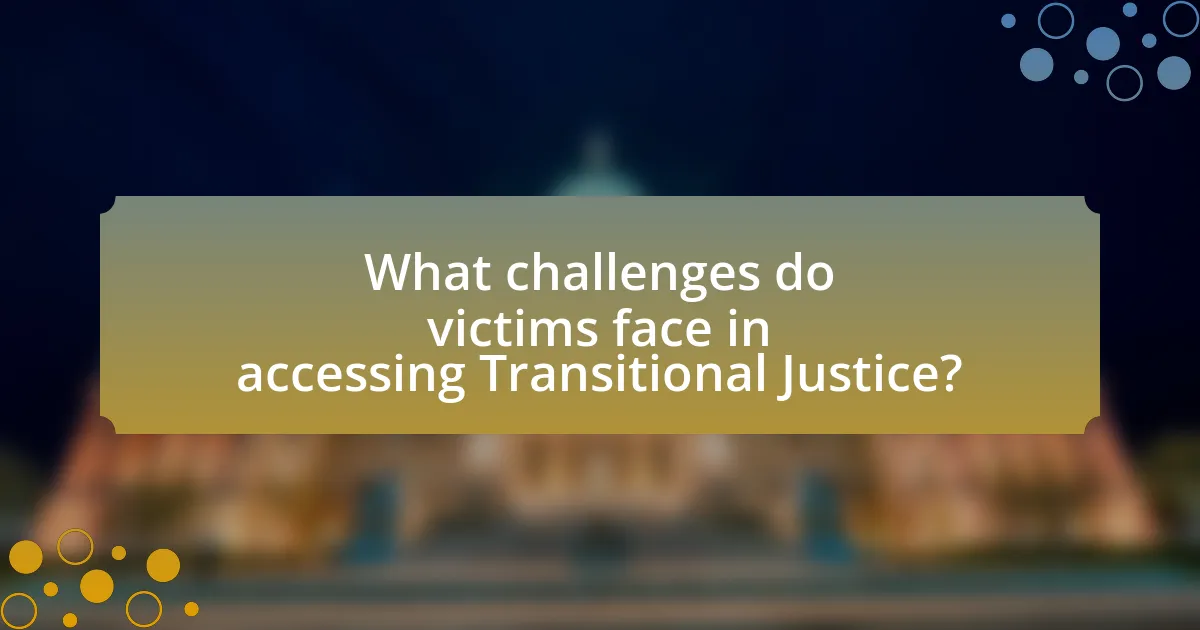
What challenges do victims face in accessing Transitional Justice?
Victims face numerous challenges in accessing Transitional Justice, including legal barriers, lack of awareness, and insufficient resources. Legal barriers often arise from complex legal frameworks that can be difficult for victims to navigate, leading to feelings of disenfranchisement. Additionally, many victims may not be aware of their rights or the mechanisms available for seeking justice, which can hinder their ability to participate in transitional justice processes. Insufficient resources, both financial and emotional, further complicate victims’ access to justice, as many may struggle to afford legal representation or the costs associated with pursuing claims. These challenges are documented in various studies, such as the United Nations report on transitional justice, which highlights the need for accessible legal frameworks and support systems to empower victims.
What barriers exist for victims of terrorism in seeking justice?
Victims of terrorism face several barriers in seeking justice, including legal, psychological, and systemic obstacles. Legal barriers often arise from inadequate laws that fail to recognize the specific needs of terrorism victims, leading to challenges in obtaining compensation or holding perpetrators accountable. Psychological barriers include trauma and fear, which can hinder victims from coming forward or participating in legal processes. Systemic obstacles involve bureaucratic inefficiencies and lack of support services, which can complicate the pursuit of justice. For instance, a report by the United Nations Office on Drugs and Crime highlights that many countries lack comprehensive frameworks for addressing the rights of terrorism victims, further impeding their access to justice.
How do political and social contexts affect access to justice?
Political and social contexts significantly influence access to justice by shaping legal frameworks, enforcement mechanisms, and public perceptions of legitimacy. In countries with unstable political environments, such as those experiencing civil conflict or authoritarian rule, the judiciary may lack independence, leading to biased legal outcomes and limited recourse for victims. For instance, in Syria, the ongoing conflict has resulted in a breakdown of legal institutions, severely restricting victims’ ability to seek justice for terrorism-related crimes. Additionally, social factors, including cultural norms and community attitudes towards victims, can either facilitate or hinder access to justice. In societies where victim-blaming is prevalent, individuals may be discouraged from reporting crimes or seeking legal redress, as seen in certain regions of Afghanistan, where social stigma affects victims of terrorism. Thus, both political instability and social dynamics play critical roles in determining the effectiveness and accessibility of justice systems for victims of terrorism.
What are the psychological impacts on victims seeking justice?
Victims seeking justice often experience significant psychological impacts, including trauma, anxiety, and a sense of empowerment or disempowerment. The process of seeking justice can trigger re-traumatization, as victims may have to relive their traumatic experiences during legal proceedings. Research indicates that approximately 70% of victims report heightened anxiety and depression when engaging with the justice system, as noted in a study published in the Journal of Traumatic Stress by authors such as Kira et al. (2018). Additionally, while some victims may find a sense of empowerment through the pursuit of justice, others may feel disillusioned if the outcomes do not meet their expectations, leading to feelings of helplessness. This duality highlights the complex psychological landscape that victims navigate in their quest for justice.
How do cultural factors influence Transitional Justice processes?
Cultural factors significantly influence Transitional Justice processes by shaping societal perceptions of justice, accountability, and reconciliation. For instance, in societies with strong communal ties, collective memory and shared narratives can dictate the demand for truth-telling and reparations, as seen in post-apartheid South Africa where cultural narratives influenced the Truth and Reconciliation Commission’s approach. Additionally, cultural norms regarding forgiveness and retribution can affect victims’ willingness to engage in formal justice mechanisms, as observed in various Latin American countries where indigenous practices of restorative justice have been integrated into formal processes. These cultural dimensions underscore the necessity for context-specific approaches in Transitional Justice to ensure they resonate with the affected communities and address their unique historical and social realities.
What role does community involvement play in these processes?
Community involvement plays a crucial role in transitional justice processes for victims of terrorism by fostering trust, promoting accountability, and ensuring that the needs of affected communities are addressed. Engaging communities allows for the incorporation of local perspectives and experiences, which enhances the legitimacy and effectiveness of justice mechanisms. Research indicates that when communities actively participate, there is a higher likelihood of successful reconciliation and healing, as evidenced by case studies in countries like Colombia and South Africa, where community-led initiatives have significantly contributed to the overall success of transitional justice efforts.
How can cultural sensitivities be addressed in Transitional Justice?
Cultural sensitivities in Transitional Justice can be addressed by incorporating local customs, beliefs, and practices into the justice processes. This approach ensures that the mechanisms for accountability and reconciliation resonate with the affected communities, fostering greater acceptance and participation. For instance, integrating traditional dispute resolution methods alongside formal judicial processes can enhance legitimacy and effectiveness, as seen in various post-conflict societies where local practices have been successfully utilized. Additionally, engaging community leaders and representatives in the design and implementation of Transitional Justice initiatives can help tailor responses to the specific cultural contexts, thereby promoting inclusivity and respect for diverse cultural identities.
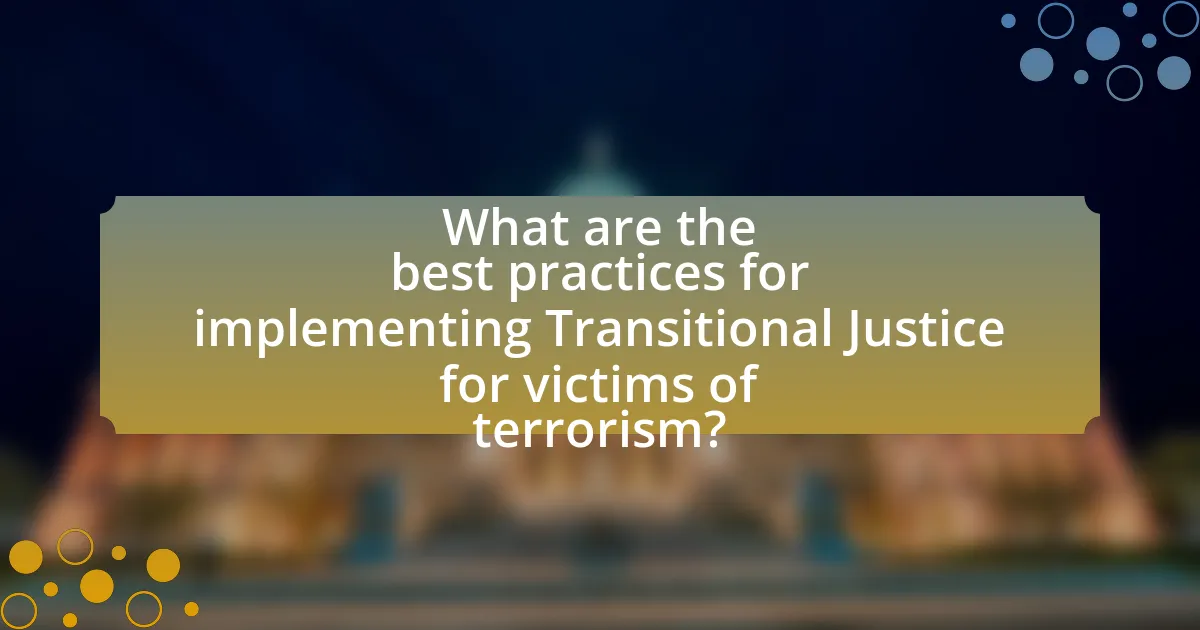
What are the best practices for implementing Transitional Justice for victims of terrorism?
The best practices for implementing Transitional Justice for victims of terrorism include ensuring victim participation, establishing truth commissions, providing reparations, and promoting accountability for perpetrators. Victim participation is crucial as it empowers individuals and communities, allowing them to share their experiences and influence the justice process. Truth commissions, such as the South African Truth and Reconciliation Commission, have proven effective in uncovering the truth about past atrocities, fostering national healing. Providing reparations, both financial and symbolic, acknowledges the suffering of victims and helps restore their dignity. Lastly, promoting accountability through legal mechanisms ensures that perpetrators are held responsible, which is essential for rebuilding trust in institutions and preventing future violence. These practices are supported by various international frameworks, including the United Nations’ Basic Principles and Guidelines on the Right to a Remedy for Victims.
How can governments effectively support victims in Transitional Justice initiatives?
Governments can effectively support victims in Transitional Justice initiatives by implementing comprehensive legal frameworks that ensure victims’ rights are recognized and upheld. Such frameworks should include provisions for truth-seeking, reparations, and participation in decision-making processes. For instance, the United Nations has established guidelines emphasizing the importance of victim participation in transitional justice mechanisms, which can enhance accountability and promote healing. Additionally, countries like South Africa have demonstrated the effectiveness of inclusive approaches through their Truth and Reconciliation Commission, which allowed victims to share their experiences and seek justice. These measures not only validate victims’ experiences but also foster societal healing and reconciliation.
What role do NGOs and civil society organizations play?
NGOs and civil society organizations play a crucial role in transitional justice for victims of terrorism by advocating for victims’ rights, providing support services, and promoting accountability for perpetrators. These organizations often serve as intermediaries between victims and state institutions, ensuring that victims’ voices are heard in the justice process. For instance, organizations like the International Center for Transitional Justice have documented the experiences of victims and pushed for legal reforms in various countries, highlighting the importance of victim participation in justice mechanisms. Their efforts contribute to the establishment of legal frameworks that recognize and address the needs of victims, thereby fostering societal healing and reconciliation.
How can international cooperation enhance Transitional Justice efforts?
International cooperation can enhance Transitional Justice efforts by facilitating the sharing of best practices, resources, and expertise among nations. Collaborative frameworks, such as the International Criminal Court and various United Nations initiatives, provide platforms for countries to work together in addressing human rights violations and ensuring accountability. For instance, the establishment of hybrid courts, which combine international and local legal practices, has been successful in countries like Sierra Leone and Cambodia, demonstrating how international support can strengthen local justice mechanisms. Furthermore, joint investigations and evidence-sharing agreements can lead to more comprehensive and effective prosecutions of perpetrators, thereby reinforcing the rule of law and promoting healing for victims.
What lessons can be learned from successful Transitional Justice cases?
Successful Transitional Justice cases demonstrate the importance of inclusivity and community involvement in the reconciliation process. For instance, the Truth and Reconciliation Commission in South Africa effectively engaged various societal groups, which fostered a sense of ownership and legitimacy in the process. Additionally, successful cases highlight the necessity of addressing victims’ needs through reparations and acknowledgment of their suffering, as seen in the case of the Guatemalan peace accords, which provided reparations to victims of state violence. Furthermore, establishing a clear legal framework and accountability mechanisms is crucial, as evidenced by the International Criminal Tribunal for the former Yugoslavia, which reinforced the rule of law and set precedents for future justice efforts. These lessons underscore that successful Transitional Justice requires a multifaceted approach that prioritizes victim participation, legal accountability, and societal healing.
Which countries have effectively implemented Transitional Justice for terrorism victims?
Countries that have effectively implemented Transitional Justice for terrorism victims include Colombia, South Africa, and Tunisia. Colombia established the Victims’ Law in 2011, which provides reparations and recognition for victims of armed conflict and terrorism. South Africa’s Truth and Reconciliation Commission addressed human rights violations during apartheid, offering a model for acknowledging victims’ experiences. Tunisia’s transitional justice process, initiated after the 2011 revolution, includes mechanisms for accountability and reparations for victims of state violence and terrorism. These countries demonstrate successful frameworks for addressing the needs of terrorism victims through legal and institutional measures.
What strategies contributed to their success?
The strategies that contributed to the success of transitional justice for victims of terrorism include inclusive dialogue, legal accountability, and community-based reparations. Inclusive dialogue fosters participation from victims, ensuring their voices are heard and needs addressed, which enhances legitimacy and trust in the process. Legal accountability, through trials and truth commissions, holds perpetrators responsible, thereby reinforcing the rule of law and deterring future violence. Community-based reparations provide tangible support to victims, helping to restore dignity and promote healing within affected communities. These strategies have been validated by various case studies, such as the Truth and Reconciliation Commission in South Africa, which demonstrated that inclusive processes lead to more sustainable peace and reconciliation outcomes.
What practical steps can victims take to engage with Transitional Justice mechanisms?
Victims can engage with Transitional Justice mechanisms by actively participating in truth commissions, submitting testimonies, and seeking reparations. Truth commissions provide a platform for victims to share their experiences, which can help document human rights violations and promote accountability. Submitting testimonies allows victims to contribute to the historical record and influence policy changes. Additionally, victims can pursue reparations through legal channels, which may include financial compensation or access to services, thereby acknowledging their suffering and facilitating healing. These steps are supported by various international frameworks, such as the United Nations Basic Principles and Guidelines on the Right to a Remedy and Reparation for Victims, which emphasize the importance of victim participation in transitional justice processes.
